If regular concertgoers thought that they knew what to expect from a lute-song recital or a lieder programme, the second evening of this year’s Oxford Lieder Festival would certainly have disabused them of their presumptions. Two sell-out performances, the first by the German baritone Benjamin Appl and French lutenist Thomas Dunford in Mansfield College Chapel, the second by the Dutch baritone Thomas Oliemans in the Holywell Music Room, prompted interesting reflections on genre, the relationship between performer and audience, and also between the music of the past and the present.
Thomas Oliemans has visited Oxford Lieder many times, appearing regularly with the pianist Malcolm Martineau, but on this occasion Oliemans, who is also a pianist, revived the tradition of the singer-pianist, accompanying himself in a performance of Schubert’s Winterreise. (This was the first of three such singer-pianist concerts at the Festival this year: Claire Booth will be performing a programme, Life & Love, on 19th October and Rachel Fenlon will give a late-night concert on 28th October.)
Contemplating this proposal before the concert, I confess that I had several misgivings. How is it possible to sing ‘properly’ if one is seated at a keyboard, using a very different set of muscles to that employed in vocal production? And what of the respective roles of the voice and piano in Schubert’s great cycle? Perhaps one might think of them playing dramatic and narrative functions, respectively (though that’s not to suggest that neither fulfil the other, complementary role on occasion). Is it possible to embody both personas simultaneously; to bring to life both the conscious and the subconscious voices in the cycle; to bring the settings before us and to live the journey? Is the inherent tension within the interactions between voice and piano, and text and music – the way the character of the vocal line may be shaped by the piano introduction, for example – weakened if the dialogue between the two is interiorised within a single performer?
Of course, the very first performance of Winterreise, in autumn 1827, was by a singer-pianist – the composer himself. Joseph von Spaun, a friend of Schubert’s since childhood, described the occasion: ‘Schubert’s mood became more gloomy, and he seemed upset. When I asked him what the matter was, he merely said, “You will soon hear and understand. Come to Schober’s [Franz von Schober] and I will sing a cycle of awe-inspiring songs. I am anxious for your opinion of them, for they have affected me more than any of my earlier songs.” So, in a voice wrought with emotion, he sang the whole of Winterreise [that is, the first 12 songs] to us, accompanying himself on the piano. We were quite dumbfounded by the black mood of the songs, and Schober said he liked only one, ‘Der Lindenbaum’. To which Schubert said, “Wait. You will learn to appreciate them.”’
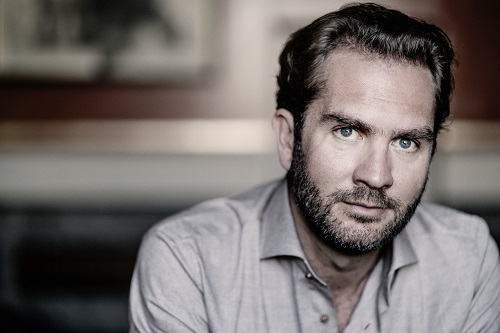
And, they did. The member of Schubert’s circle might have been disconcerted not only by the desolate melancholy of the songs, but also by what was described as Schubert’s ‘composer’s singing voice’. But, when the complete cycle was presented to the company the following year, it was Johann Michael Vogl, the composer’s favourite interpreter, who sang the wanderer’s songs, and Spaun noted the ‘the profound effect of these melancholy songs, which Vogl performed in a masterly way’.
Moving on from this long preamble, I supposed that the question is essentially, on the evidence of Oliemans’ performance, was I convinced that a singer-pianist performance of Winterreise can ‘work’, or not? The answer is probably, yes and no. There was no doubt that the capacity audience in the Holywell Music Room were transfixed by Oliemans’ performance, the intensity of which was deepened by the proximity of audience and performer within the small venue. There could be nothing but astonishment and admiration for the baritone’s concentrated self-immersion in the cycle – in every element of its expressive means – and for his technical accomplishment and sheer stamina.
And, there were some beautiful and compelling moments in this Winterreise. Oliemans has quite a dense low timbre, though surprisingly he was often at his best in the more gentle songs. He used his head voice beautifully at the end of ‘Gute Nacht’, for example, and when in ‘Wasserflut’ (Flood) he addressed the snow which freezes his tears, the delicate pianissimo beautifully conveyed the fragility of mind and spirit. The warmth of Oliemans’ baritone in ‘Geforne Tränen’ paradoxically but effectively conveyed the scalding heat buried deep within the wanderer’s heart from which his frozen tears well up. ‘Ihrlicht’ (Will-o’-the-wisp) was sensitively interpreted: textual repetitions were thoughtfully shaped and the closing image – “Jeder Strom wird’s Meer gewinnin,/ Jedes Leiden auch sein Grab” (every river will reach the sea; every sorrow, too, will reach its grave) – was deeply touching in its quiet resignation.
But, at times the vocal phrasing seemed neglected because of the need to negotiate challenging piano writing or attend to the psychological import of the piano’s gestures. And, at other times, the ‘meaning’ of the latter was overlooked, when the expressive burden of the vocal line came to the fore; when the voice entered in ‘Der Greise Kopf’, the piano retreated to the shadows, and in ‘Die Krähe’ the crow’s ceaseless circlings lacked evenness. The barking of the dogs and the rattling chains were surely not fierce enough to trouble the nocturnal wanderer in ‘Im Dorfe’ (In the village).
Overall, there was less a sense of dialogue between voice and piano, and more a unified utterance – perhaps not a negative thing, though a piano crescendo would prompt a vocal expansion, for example, a concordance which is surely not an interpretative necessity. And, I missed the sort of rhythmic tension, which requires discipline and precision, of the kind we find at the close of ‘Der Lindenbaum’, where the triplets against dotted rhythms evoke the wanderer’s restlessness and fears, and similarly throughout ‘Wasserflut’ where the misalignment communicates the pain of the traveller’s ‘burning grief’ (‘das heisse Weh’). For me, there was often a feeling of haste, as the piano pushed forward – ‘Estarrung’ (Numbness) seemed rushed, and the textures in ‘Rückblick’ (Backward glance) were rather muddy – and I’d have liked the vocal phrases to have had more space and time.
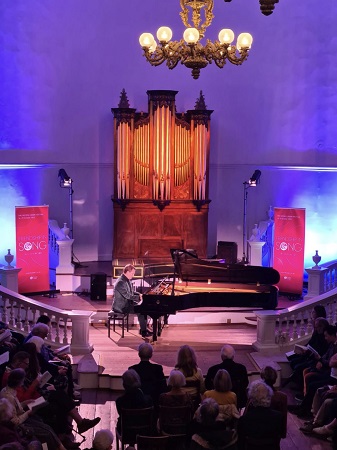
Oliemans also – and absolutely understandably – seemed to tire in the later songs. He’s a talented pianist, and there were thoughtful interpretative nuances throughout the cycle. Careful emphases in the introduction to ‘Gute Nacht’ conveyed both the emotional weight born by the wanderer and the weariness of his steps through the snow; virtuosity was evident in ‘Frühlingstraum’ as he negotiated the changing tempi and moods; the galloping of ‘Die Post’ had stirring character and brightness; the piano’s turn-like melodic gestures were articulated sensitively in ‘Der Wegweiser’ (The signpost). But, the rhythmic arguments of ‘Letzte Hoffnung’ needed more definition and clarity; and from ‘Tauschen’ onwards, the piano did not, for me, conjure the increasing desolation of the traveller’s mental landscape. There was some unsteadiness in the voice, too, especially in the upper register.
The psychological impact of the cycle also seemed weakened by the fact that there could be no eye contact or direct, physical communication between singer and audience, something that is so much at the heart of lieder singing. We need to feel that we are travelling with the wanderer on his tragic journey, and maybe too that we are in some way implicated in his suffering.
Perhaps it is just not possible for a single performer to give equal attention to both piano and vocal line in Winterreise, and to embody and differentiate them concurrently, while also creating a symbiotic dialogue? While in Schubert’s earlier cycle, Die schöne Müllerin, the piano pictorially supplements the text, in Winterreise it interprets that text and embodies its psychological and emotional intimations. And, in the final song it becomes ‘the protagonist’: the hurdy-gurdy man’s miserable, spare song, with which the wanderer, in his abjection, feels a wretched affinity. The indifference of the piano’s static repetitions to the wanderer’s final plea, ‘Will you turn your hurdy-gurdy to my songs?’ conveys the latter’s absolute alienation, but Oliemans’ rather calm vocal delivery did not convince me of the traveller’s despairing decline into the abyss.
I admit, though, that such observations and details do not do justice to the holistic impact of Oliemans’ performance. Although my pre-concert misgivings were not entirely allayed, I enjoyed this Winterreise – for musical and intellectual reasons. Without a doubt, the Dutch baritone deserved the standing ovation he received.
Seated in the audience, taking the opportunity to enjoy and admire Oliemans’ performance were the French soprano Clara Barbier Serrano and the Polish pianist Joanna Kacperek, whose Emerging Artists showcase had preceded Winterreise. The musicians are both graduates of the Royal College of Music. Recently I have admired Barbier Serrano’s performances in the RCM’s Opera Studio productions of The Magic Flute (The Queen of the Night) and, earlier this year, Hansel and Gretel (Dew Fairy). What I previously described as her ‘cut-glass soprano’ was much in evidence here, and impressively so. This was an imaginative and ambitious programme, though I wasn’t sure why the duo chose to fragment Britten’s French folk-song setting, Il et quelqu’un sur terre,and disperse the verses between the other items? That said, this beautifully restrained song was sung with sombreness and purity.
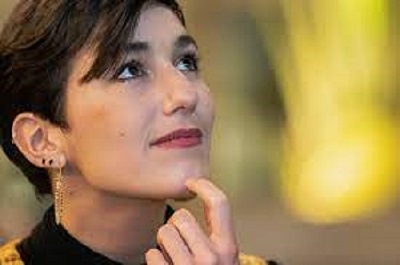
Schubert’s ‘Der Musensohn’ (The Son of the Muses) was bright and agile, and Barbier Serrano whipped through the text with impressive accuracy and clarity. There were two songs by Clara Schumann. Kacperek was ever bit a collaborative interpreter and in ‘Der Wanderer in der Sägemühle’ (The wayfarer in the sawmill) her judicious use of contrasting tone and tempo persuasively underpinned the structure of the song, which tells of a wanderer’s encounter with a talking tree – a symbol of the destruction of nature caused by the Industrial Revolution – while in ‘Mein Stern’ her rich arpeggiation created a beautiful soft bed upon which Barbier Serrano could sparkle as the poet-speaker admires the star that offers consolation, passion and dreams in the night. Best of all was Kaija Saariaho’s ‘Il pleut’, a setting of Apollinaire. Spare and fragile, the piano’s free, scalic descents conjured the weighted fall of the rain, onomatopoeic and immediate, while Barbier Serrano soared, moving between stratosphere and earth with crystalline precision and gleaming tone. It was a wonderfully sensitive and enchanting interpretation from two of this year’s Oxford Lieder Young Artists.
Earlier in the evening, Appl and Dunford had presented a recital titled The Songwriter, which Dunford described as a “crazy programme”. And, in many ways it was! It opened with familiar Elizabethan lute songs and dances, but the rest of the programme comprised songs – German lieder, French mélodie, and music theatre, popular and folk song from the twentieth century – arranged for lute and voice, with Dunford’s lute extemporisations and other instrumental items linking the eclectic chain into an evolving sequence which invited reflections on the relationship between singer and accompanist, performers and audience, the musical past and present. One might wonder what links Dowland, Schubert, Hahn, Rodgers and Hammerstein, and Eric Clapton. But, as Appl commented, composers and performers of the twenty-first century are telling the same stories, and expressing the same human emotions, in music and words as they were 400 years ago.
Appl seemed most at home in the sequence of four Schubert lieder, which he sang from memory. His strengths are a lovely burnished tone, especially in the middle register, and considerable sweetness at the top, and in ‘Meeres Stille’ (Calm sea) he spun a wonderfully even line, as Dunford teasingly evoked the quiet ripples that the singer declares do not stir the surface of the motionless, glassy waters. Both performers were seated, and while Appl’s platform manner was pleasingly relaxed, I wondered if he was a little too subdued in these lieder? ‘Nachtstück’ (Nocturne) was languorous and deeply introspective, as if the baritone was singing to himself, almost unaware of the audience in Mansfield College Chapel, though Dunford’s lute offered a springboard for a more compelling vocal delivery.
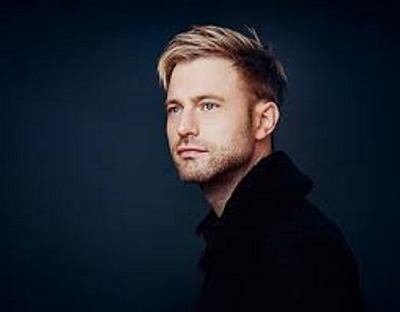
I’m not sure that ‘Die Leiermann’ was a sensible choice – can it ever retain its ‘meaning’ when removed from its place at the close of Schubert’s cycle? And, here, it was, preceded by a brief stanza of Dowland’s ‘Flow my tears’, presumably to emphasise the prevailing misery of both. I wasn’t convinced either by some of Appl’s vocal nuances – why elongate a phrase when the text tells us that the hurdy-gurdy man’s song goes on, never stopping – but the baritone’s pianissimo was beautiful and beguiling.
Appl’s lovely head voice was also put to good effect in Reynaldo Hahn’s ‘A Chloris’, though here and elsewhere he was at times a little under the note – and, I wondered whether the lute provided the sort of structural and harmonic support offered by the piano. Though his German and, especially, English diction were excellent, the baritone’s French was less idiomatic, but he floated beautifully to the top, capturing the almost otherworldly preciousness of the exquisite hour.
Proceedings took a light-hearted turn when one of the ushers appeared to interrupt the performers to deliver an inauspicious looking envelope. It turned out, we were led to believe, to contain the vocal score of André Messager’s ‘J’ai deux amants’ from L’Amour masque. Another slightly strange choice given that the pleasing but slight song is sung by the twenty-year-old Elle, whose two rich lovers seek to out-compete each other with lavish gifts, and whose foolishness she ridicules, though the duo enjoyed the gentle humour. It sent the programme spinning towards the twentieth century, and to songs – ‘Eidelweiss’, McCartney’s ‘Blackbird’ and Clapton’s ‘Tears in Heaven’ – which allowed Dunford to demonstrate how to croon a sweet countermelody, and, in Ralph McTell’s ‘Streets of London’, to indulge his guitarist manqué yearnings.
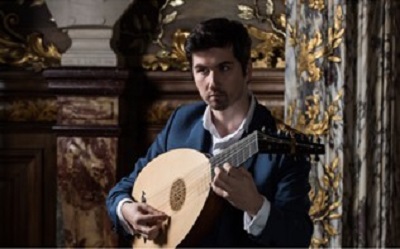
Dunford’s instrumental interweavings were in fact, for me, the highlight of the recital. Appl described his friend as “a genius”, and I’m not inclined to disagree! In Dowland’s Semper Dowland, semper dolens and ‘The King of Denmark’s Galliard’; in arrangement of movements from Bach’s Cello Suite No.1 in G major; and, most especially in Marin Marais’s exquisite Le voix humaines, he cast his customary spell, performing with trance-like concentration and imaginative sorcery, his fingers crabbing around the lute frets, his left wrist twisting and circling balletically, his right hand fingers brushing, teasing, tickling the strings while a firm, flexible thumb makes the lute’s bass resonate with both authority and ingenuity. All while his eyes never once blinked, seeming fixedly intent upon some spirit-muse in the hinterland or heavens. (Sometimes the improvisatory roving seemed to unsettle Appl, who glanced more than once at Dunsford’s tablet to make sure he had the correct programme order.)
The programme had begun with lute songs by Dowland. I found Appl less satisfying here. He seemed not entirely familiar with the music, rather score-bound at times, and his vocal mannerisms didn’t convince me that he was happily settled within the idiom. ‘Come again, sweet love doth know invite’ felt too ‘big’ to me, the vocal tone generally appealing but sometimes pushed too hard and becoming inflexible and heavy, with strange emphases and leanings. He worked rather too hard in ‘Flow my tears’, too, though the pianissimo repeat of the final stanza was beautiful.
What do I know, though! At the end of the recital the delighted audience would not let the duo go, and begged an encore. Asked what they would like to hear again, they chose Dowland, and so we had a lively reprise of ‘Come again’ in which Dunford’s deft vocal syncopations doubled the lute’s rhythms as they chased the voice. Not for the first time, there was mischief as well as magic in the music which rang through Mansfield College Chapel.
Claire Seymour
Benjamin Appl (baritone), Thomas Dunford (lute)
Dowland – Come again, sweet love doth now invite, I saw my lady weep, Semper Dowland, semper dolens (solo lute), Flow, my tears, The King of Denmark’s Galliard (solo lute), Can she excuse my wrongs?; Bach – movements from Cello Suite No. 1 in G Major BWV 1007 (solo lute); Schubert – Meeres Stille (D216), Frühlingsglaube (D686), Nachtstück (D672), Der Leiermann from Winterreise; Hahn – A Chloris, L’heure exquise from 7 Chansons GrisesI; Marais – Le voix humaines (solo lute); Fauré – Les berceaux (Op.23 No.1); Messager – J’ai deux amants from L’amour masque; Richard Rodgers – Edelweiss from The Sound of Music; Ralph McTell – Streets of London; Paul McCartney – Blackbird; Eric Clapton – Tears in Heaven.
Mansfield College Chapel, Oxford; Saturday 15th October 2022.
Clara Barbier Serrano (soprano), Joanna Kacperek (pianist)
Britten – Il est quelqu’ un sur terre; Schubert – Der Musensohn (D764); Clara Schumann – Der Wanderer in der Sägemühle; Kaija Saariaho – Il pleut; Clara Schumann – Mein Stern
Thomas Oliemans (baritone)
Schubert – Winterreise (D911)
Holywell Music Room, Oxford; Saturday 15th October 2022.
ABOVE: ‘Schubertiade’ by Moritz von Schwind (1868).